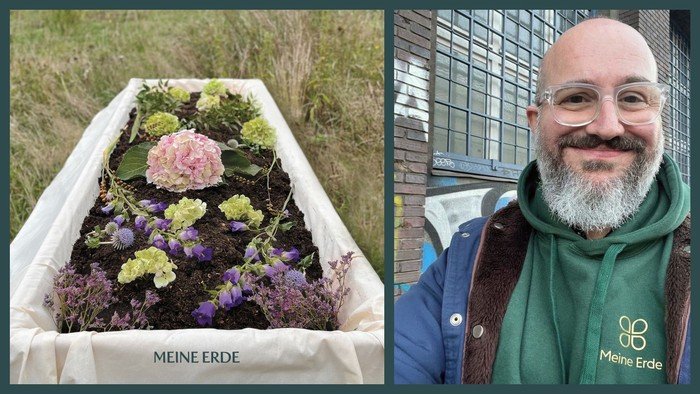Funeral - climate protection beyond death.
By Jörg Litwinschuh-Barthel
Luther Bible, quotation Sirach 40, 11: "Everything that comes out of the earth must become earth again, just as all waters flow back into the sea."
The Protestant Church in Germany is a pioneer when it comes to burial: In the town of Mölln, the Nordkirche - the regional protestant church in the federal states of Schleswig-Holstein, Hamburg, and Mecklenburg-Vorpommern - approved a new form of burial, Reerdigung, for the first time at the town's Protestant cemetery. The state government of the responsible federal state of Schleswig-Holstein previously permitted this unique form of burial in the ground as a pilot project. In this process, a deceased person is buried unclothed in a straw and green waste substrate. Natural microorganisms transform the deceased's body into the soil within 40 days. The remaining bones are then ground up and added to this soil. Morticians then place this new soil without a coffin about 40 cm deep into the cemetery ground, and cemetery soil is added. This fresh life-giving soil is ideal for planting on the grave, for example, a shrub or a small tree. This most sustainable burial form was developed by entrepreneurs Pablo Metz and Max Huesch. They founded the startup Circulum Vitae for this process in Berlin. For the first time in Germany and Europe, they have offered this type of funeral since February 2022 under the brand MEINE ERDE (MY EARTH). Together with the Protestant Cemetery Association Berlin City Centre (Evangelischer Friedhofsverband Berlin-Stadtmitte), MEINE ERDE now wants to offer the funeral service in the cemeteries of the church district. In a theological-ethical statement, Dr. Clemens W. Bethge of the consistory of the EKBO (Protestant Church of Berlin-Brandenburg-Silesian Upper Lusatia) writes: "Finally, the ethical aspect of the climatic compatibility of the funeral form 'Reerdigung' is not to remain unmentioned: The immense CO2 saving in the comparison to the cremation is to be emphasized positively and corresponds to our order to use the resources of our creation carefully, as well as to preserve the wealth of our creation". Still, the authorities in Berlin examine when Reerdigung is permitted here in Berlin. Presumably, the federal state of Berlin will first amend its burial law.
More and more citizens are now thinking about a sustainable burial: According to a survey by the opinion research institute YouGov, most adults in Germany no longer want to be buried in a coffin. According to a recent nationwide study conducted by the Forsa Institute on behalf of the consumer organization Aeternitas, 60% of the participants "consider the topic of ecology and sustainability in burial as important," 22% of them as "very important." In a survey commissioned by MEINE ERDE in May 2022, among 56 to 80-year-olds from Berlin, 61% stated: "that it bothers them that cremation is harmful to the environment." Nevertheless, the proportion of cremations in Berlin is 90%. The age group of 56 and older is where most decisions are made about how to bury oneself or loved ones. Superintendent Dr. Bertold Höcker of the Protestant church district of Berlin Cinter Center says: "I can well imagine the Reerdigung also for myself. Every person has to die. But we suppress the fact that not every form of burial helps our environment. In the USA, Reerdigungen has long been possible. We should talk about the fact that burial can also be sustainable." In the U.S., there is already much competition for Reerdigumgen: Several providers, such as the company "Recompose" in Seattle (Washington), offer similar procedures. They call it Natural Organic Reduction (NOR). It remains hopeful that the Senate of the federal state of Berlin and the Berlin House of Representatives will quickly enable sustainable reburial in Berlin as well.

About the author:
Jörg Litwinschuh-Barthel (54) is a member of the Protestant Church District of Berlin City Centre and a permanent employee of Circulum Vitae. There, the media scientist takes care of the relations with the churches, the cemetery administrations, and politics.

